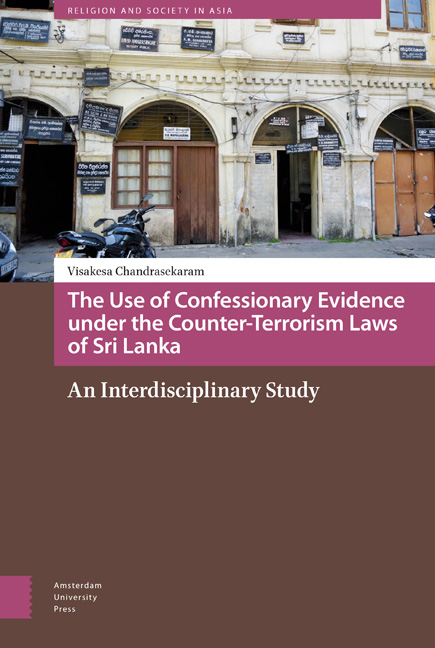 Use of Confessionary Evidence under the Counter-Terrorism Laws of Sri Lanka
Use of Confessionary Evidence under the Counter-Terrorism Laws of Sri Lanka Book contents
- Frontmatter
- Dedication
- Contents
- 1 Do Tigers Confess?
- 2 Rebellion and Martyrdom
- 3 Facts, Falsities, and Fictions
- 4 Punitive Interrogation of Tamil Tiger Suspects
- 5 Judgement of the Terrorist Against the ‘Formula of Justice’
- 6 Fantasies, Fictions, Myths, and Denials about Tamil Tigers’ Confessions
- Appendix
- Acronyms
- Acknowledgements
- About the author
- Bibliography
- Index
3 - Facts, Falsities, and Fictions
Published online by Cambridge University Press: 10 December 2020
- Frontmatter
- Dedication
- Contents
- 1 Do Tigers Confess?
- 2 Rebellion and Martyrdom
- 3 Facts, Falsities, and Fictions
- 4 Punitive Interrogation of Tamil Tiger Suspects
- 5 Judgement of the Terrorist Against the ‘Formula of Justice’
- 6 Fantasies, Fictions, Myths, and Denials about Tamil Tigers’ Confessions
- Appendix
- Acronyms
- Acknowledgements
- About the author
- Bibliography
- Index
Summary
Focusing on the systems established by the LTTE to prevent its members from being arrested alive, the discussion presented in the previous chapter cast significant doubt on the validity of the state's mass prosecution of the Tamil Tigers in Sri Lanka. In contrast, this chapter aims to explore the validity of the mass prosecution strategy by focusing on the systems established by the police to gather evidence against the terrorists. This chapter will concentrate on the text of the confessions, rather than police interrogation methods or court trials. Accordingly, the chapter will probe the official narratives of the state, as presented by its agents, the police, in asking the question: Can the authenticity of Tigers’ confessions be determined by linguistic and narrative analysis methods? This enquiry will involve investigating the process used by the police to convert oral narratives into written narratives, identify the templates used to construct the text, analyse the structure of confessions and identify other common elements related to the content. This will require exploring the ‘institutional voice’ that results from the co-narration of the confessionary statements by the police, and investigating whether this voice influenced or altered the voices of the suspects. In this exercise, a methodology based on narrative analysis techniques will be devised and applied to distinguish true confessions from false ones. This methodology has been developed outside the system of criminal justice procedures, and adopts an alternative strategy to that of conventional legal discourse in determining the guilt of a terrorist. The methodology used in this chapter includes a comparative analysis of a sample of 28 confessions. In addition, four confessions from the sample will be analysed in detail: the confessions of two convicted rebels and those of two acquitted suspects.
Because a written statement elicited from a suspect is given ‘supremacy’ over oral evidence in the criminal justice system, the confession possesses a great deal of persuasiveness and conclusiveness as a piece of evidence. Thus, the written statement becomes an authoritative text that can be used against the witness – the original source of the information. Therefore, once a confessionary statement is written and signed by a suspect, it is almost impossible to question its validity beyond probing the statement as part of a laborious court hearing.
- Type
- Chapter
- Information
- Use of Confessionary Evidence under the Counter-Terrorism Laws of Sri LankaAn Interdisciplinary Study, pp. 79 - 114Publisher: Amsterdam University PressPrint publication year: 2017


